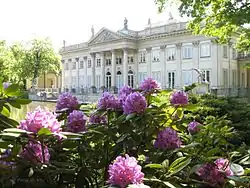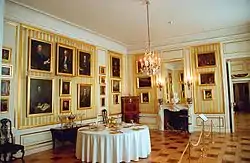Thursday Lunches
Thursday Lunches (Polish: obiady czwartkowe) were gatherings of artists, intellectuals, architects, politicians and statesmen held by the King of Poland, Stanisław II August during the Enlightenment in Poland.


History
Stanisław II August was a patron of the arts and learning.[1] It was during his reign that Poland's Age of Enlightenment (begun in the 1730s–40s), reached its peak. It went into decline with the Third Partition of Poland in 1795. During the Age of Enlightenment, Warsaw was modernised and became a favourite meeting place for notable people in the world of art, architecture and literature along with other intellectuals and statesmen. The King invited influential figures of the time to his Thursday Lunches. He founded the School of Chivalry.
The lunches were usually held in the Royal Castle and in summer in the Water Palace in Warsaw, between 1770 and 1784. During the gatherings, which typically lasted three hours and were akin to French salons, the King and his guests discussed literature, art and politics over a light meal. The number of guests varied over the years, with about thirty regulars, including politicians, writers, bibliophiles, military officers of rank and philosophers. Guests of note included:
- Ignacy Krasicki
- Franciszek Bohomolec
- Adam Naruszewicz
- Ignacy Potocki
- Stanisław Kostka Potocki
- Hugo Kołłątaj
- Jan Śniadecki and Jędrzej Śniadecki
- Stanisław Konarski
- Tomasz Adam Ostrowski
- Józef Szymanowski
- Andrzej Zamoyski.
The king also held less well-known Wednesday Lunches, Obiady Środowe. While the guests at the Thursday Lunches were usually writers, poets and artists, the Wednesday Lunches brought together educators, scientists and political activists.
The Thursday Lunches spawned the first Polish literary magazine, Zabawy Przyjemne i Pożyteczne - "Diversions Pleasurable and Useful", published from 1770 to 1777.
In the 1990s, Warsaw Mayor Paweł Piskorski picked up on the tradition by holding Tuesday Breakfasts to talk over current issues with leading businessmen and activists.
Cuisine
The importance of the lunches was not the food, but the conversation, and not many menus were recorded for posterity.
See also
References
- Meer van der, Jan IJ. Literary Activities and Attitudes in the Stanislavian Age in Poland (1764-1795): A Social System?. ISBN 90-420-0933-0